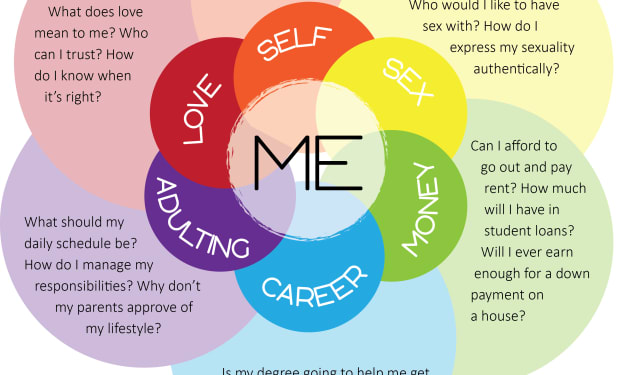What was I thinking?
How cognitive dissonance stopped me from trusting my own instincts

How is it possible to love something so much even when it causes so much pain? Why do we keep going back to the things in our lives that hurt us?
Like ice cream. I must admit, ice cream is a gift provided by the universe, no doubt in my mind. It's wildly delicious, and the varieties of ice cream available are mind-blowing. Finding out I am lactose intolerant put a screeching halt to my obsession. It's true, I feel better, but wow, do I miss it.
As far removed from trauma as ice cream is, it still provides a strong example. As an ice cream-loving, lactose-intolerant trauma survivor, I see how toxic the dedication to my abusers was. Eating ice cream when I am lactose intolerant reminds me of how it feels to be a trauma survivor. They finely crafted a strong and hard-to-break trauma bond, and they knew it.
Oh, did I mention I'm an empath, too? Empaths are like candy to narcissists. Our dedication to them is unmatched, just how they like it. They have complete freedom to treat us how they wish, with the confidence we may never realize the damage we are sustaining.
Conditioning someone to accept abuse is a slow process, requiring dedication and patience, and they know it is well worth their time. Once an empath is caught in the net of an abuser, they are all in and will stop at nothing to secure the transaction. The only thing with the power to alter the process is the survivors themselves. We must realize the circumstances and make a change within that ripples into our environment.
So, how do we make the change? It began with returning to myself: self-improvement, self-worth, and being responsive to my own needs. This may have been the most difficult process I've ever attempted, and I keep trying. The only way I've discovered to accomplish what I need is to get up, dust myself off, and approach the problem from a different angle. If this doesn't work, try again.
Cognitive dissonance seems to be the endgame for any abuser in order to have a complete grip on their victim. Through the use of love bombing, gaslighting, and a cornucopia of other techniques, the survivors become confused and have trouble understanding their dedication to the abuser.
"Why don't they just leave?"
Only the people who know what happens in the relationship are the people in the relationship. In the case of an abusive relationship, it is rarely what it seems. The dynamics of an abusive relationship can be difficult to explain and understand, especially for the survivor. Abusers behave so recklessly, and I never saw it for what it is because it was all under the mask of a loving relationship.
Cognitive dissonance happened to me when I trusted my abuser so much, and I believed them when they said I was wrong about their betrayal. I knew what I felt, and the narcissist was telling me I was way off here. So I began to doubt myself and surrendered to his lies, and suddenly, my self-doubt was a gigantic pit of despair. This created a gap between what I felt and what I was told to believe. Our abuser is relying on the fact that we’re going to want to trust them when they say there is nothing to worry about because it would destroy us if they were unfaithful, and they know that.
Cognitive dissonance is the internal struggle I experienced as an empath. The strength of the dissonance is determined by the strength of our foundation and how much we know and trust ourselves. If our past is filled with people, relationships, and experiences who have denied our authenticity, it is almost impossible to trust what is true about our own beliefs.
Being faced with adversities like avoiding accountability and denying their actions put me in a fog. My response to this was to become apologetic, and I felt awful for accusing the narcissist of such betrayal. This led to re-calibrating my natural instincts since I was going against my own truth, and it completely messed up my internal wiring. This is backed up and reinforced by an angry outrage from the narcissist, which distracts the empath and causes remorse and suffocation of our gut instincts. I was helpless and drowning in my own doubt.
Denial and gaslighting are incredibly effective, and if the survivor has the courage to question them, the narcissist simply brings up the other 1001 incidences that they’ve already established where their gut instincts were wrong.
Thankfully, his lies, gaslighting, and betrayal are not my problem anymore. Looking back on the relationship, I understand more about him than I ever did while I was in the relationship because he has revealed his true self to me. He presented me with a whole bunch of different flavors of ice cream on a big fancy platter, but what I didn't know is that he just put a fresh layer of scoops on top, and underneath was all the melted goop no one likes to eat. I think I'll pass.
About the Creator
Carrie Principe
I'm not a writer, I'm a thinker, and my life experiences, healing, and journey have given me a lot to think about.






Comments
There are no comments for this story
Be the first to respond and start the conversation.